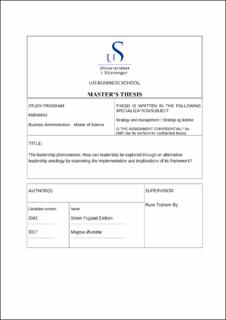The leadership phenomenon: How can leadership be explored through an alternative leadership ontology by examining the implementation and implications of its framework?
Master thesis
Permanent lenke
https://hdl.handle.net/11250/2678873Utgivelsesdato
2020-06Metadata
Vis full innførselSamlinger
- Studentoppgaver (Business) [1023]
Sammendrag
This dissertation aims to explore the leadership phenomenon through a framework and thought process that is different from the current leadership orthodoxy. The more traditional perception of leadership with leaders, followers and their common goals at the core is challenged by looking at leadership as producing DAC; direction, alignment and commitment. How can DAC be implemented in an organization? What are the implications? What does further exploration of the leadership phenomena through the DAC lens yield?
With a background that shows that leadership is poorly understood, this thesis reviews new and alternative literature of leadership practices. A study was conducted that aimed to answer these questions and look at DAC and how it would function in an organization. Empirical data was collected through interviews of employees in different positions in an international organization.
This dissertation has the world view of interpretivism. The analysis is a qualitative content analysis, and the data reveals that there are six main themes of relevance to the problem question. The findings suggest that DAC is problematic to visualize on a complete scale for employees of a large international organization, but that a DAC thought process is important on lower levels to give employees space and responsibility to develop themselves and develop smaller efficient teams. The findings also suggest that leadership culture and purpose support DAC implementation through different views from the respondents.
The last part of the problem question, exploring leadership through DAC was concluded to yield an understanding of the employees’ scope and participation in leadership, as well as a personal perception that grasps the phenomena leadership in a more complete way than the tripod. Further conclusions yields support to an implementation of DAC despite findings of reluctance and limitations of the tripod, through a cultural approach and a liberation of the tripod mindset. The implications were concluded to be several elements, with both positive and negative outcomes. Positive outcomes were: being in possession of empowerment, yielding an increased sense of responsibility and ownership. The main concern was the responsibility paradox, where making everyone responsible ultimately can make no one responsible.
This dissertation recommends future students to develop problem questions early and combine quantifiable data with leadership studies. It further recommends practitioners to regard leadership through the DAC lens, consistently challenging the ontology.
Beskrivelse
Master's thesis in Strategy and Management

